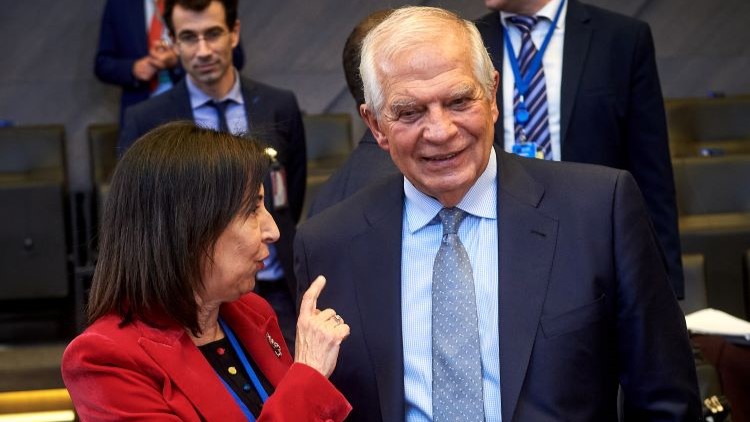The Diplomat
The Minister of Defense, Margarita Robles, discussed yesterday in Brussels, with her NATO counterparts, the military aid to Ukraine to face the Russian aggression, with special attention to the sending of battle tanks. In this regard, she announced that Spain will receive at the end of this week fifty Ukrainian soldiers to instruct them in the handling of the Leopard tank.
Robles, who is in the Belgian capital to attend the meeting of the North Atlantic Council of defense ministers, participated in the morning in the meeting of the Ukraine Defense Contact Group, chaired by the U.S. Secretary of Defense, Lloyd Austin, and in the afternoon in the first informal session of the regular meeting of NATO defense ministers, also chaired by Austin and attended by the Ukrainian Minister of Defense, Oleksii Reznikov, and the High Representative for Foreign Affairs and Security Policy of the European Union, Josep Borrell.
The Minister also held bilateral meetings with her counterparts from Estonia, Canada, Romania and Latvia at NATO Headquarters in Brussels and concluded the day with her participation in a working dinner with the defense ministers of the North Atlantic Council. During one of these meetings, Robles signed an agreement with the Estonian Minister, Janno Pevkur, whereby Spain undertakes to deploy in Estonia, starting in April and for four months, a Nasams anti-missile battery for the protection of its airspace, similar to the one sent to Latvia in June last year.
During the Contact Group meeting, Robles reiterated to her counterparts that “Spain will continue to support Ukraine with material, training and humanitarian aid, within our possibilities” and stressed the importance of coordinating the sending of aid between the different allied countries, because “the most important thing is not what a country can send, but the interoperability they have”. “Decisions will be taken fully in accordance with what is decided with the allies and taking into account the needs of Ukraine,” she added.
Also, during the subsequent NATO ministerial meeting, which addressed the management of NATO assistance to Ukraine in the short and medium term through the Comprehensive Assistance Package to Ukraine and underlined NATO’s commitment to the so-called “partners at risk” (Bosnia and Herzegovina, Georgia and Moldova), Margarita Robles expressed her appreciation to the Ukrainian citizens “who are striving to ensure their self-defense, freedom and dignity” and highlighted the particular case of Moldova, a partner “at risk” with whom Spain has recently initiated new channels of cooperation.
Speaking to the media in the margins of the two meetings in Brussels, the minister announced that the Spanish Armed Forces will train 55 Ukrainian soldiers who will arrive in our country at the end of this week to be trained in the handling of Leopard battle tanks.
However, Robles could not specify the exact number of tanks that Spain will provide, although she did indicate that the tanks and the trained crews will be ready by the end of March. “As important as the number of tanks to be sent is the training of the crews and maintenance. This goes hand in hand,” she added. In any case, she said, the Leopard 2A4s that Spain has committed to send to Ukraine are currently being overhauled and overhauled, since some of them are in a “deplorable state” after more than ten years stored and unused in a warehouse in Zaragoza. Therefore, the final figure will depend on the repair and “coordination with the allies”.
For his part, Oleksii Reznikov yesterday asked Spain for “practical decisions” regarding the sending of tanks, although he acknowledged, in declarations to the Europa Press agency, that military aid should not come from a single country and that Ukraine’s objective is to “form battalions”, with the contributions of the allies, which “may include Spanish, Portuguese or Canadian tanks”.





